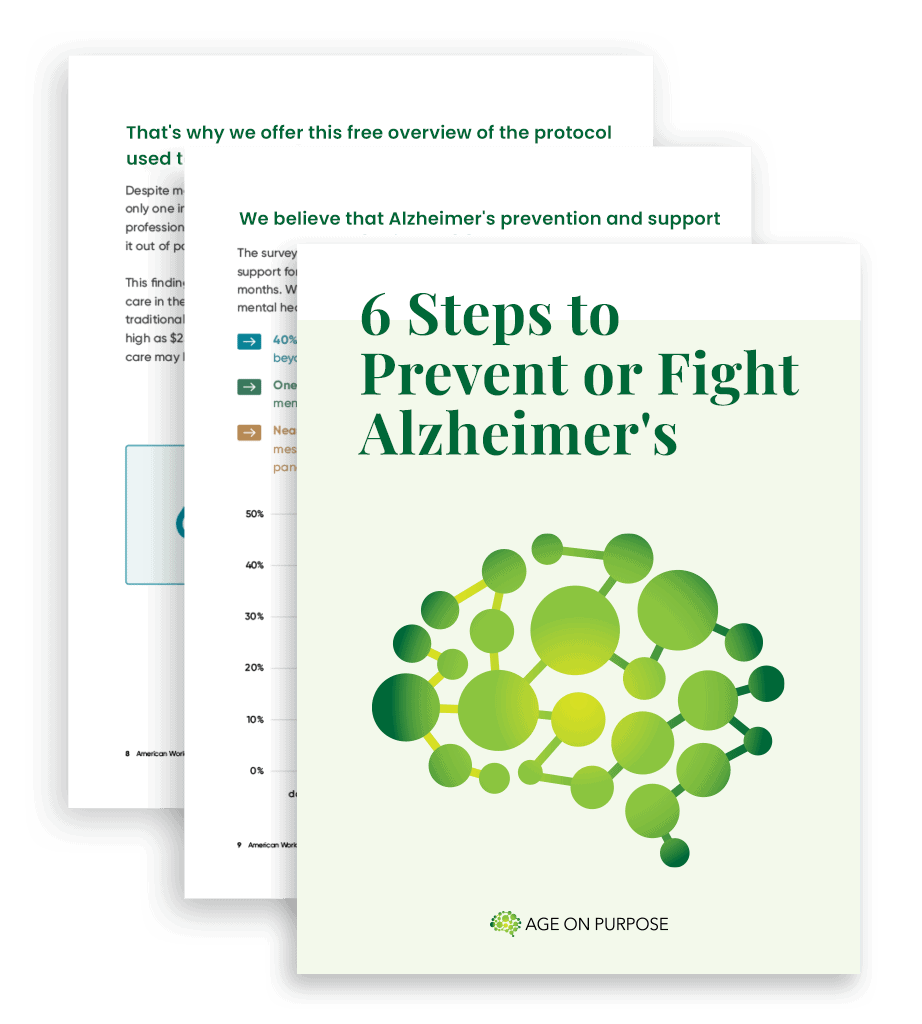When it comes to personal health, transparency is non-negotiable.
You deserve the facts.


The Practitioner

The Process

The Proof

Hi, I’m Angela Chapman, M.Ed, FDN-P.
Genetically at risk myself, I have committed my career to helping others prevent and reverse Alzheimer’s.
Angela Chapman, Functional Diagnostic Nutrition Practitioner, ReCODE 2.0 certified, Health Education
My background & training.
I’m a Functional Diagnostic Nutrition Practitioner (FDN-P), which means I take a holistic approach to wellness and utilize functional lab testing to identify hidden, root-cause contributors to chronic disease in order to develop personalized wellness plans for my clients. I specialize in helping people prevent and reverse cognitive decline using the “cognoscopy” lab testing that’s part of the ReCODE™ protocol.
I am ReCODE 2.0 certified. The ReCODE™ protocol is the only program proven to prevent and reverse symptoms of Mild Cognitive Impairment and early Alzheimer’s. I received my initial training from Dr. Dale Bredesen at the Buck Institute for Research on Aging in 2016 and my 2.0 re-certification training in 2022.
My Prodrome Scan certification enhances my ability to discover biochemical deficiencies and imbalances that underly Alzheimer’s disease. The Prodrome Scan reports over 40 different biomarker levels for a prodromal assessment of critical biochemical systems in our bodies, including mitochondrial and peroxisomal function, plasmalogen levels, and the body’s ability to make plasmalogens. Low levels of plasmalogens are closely associated with Alzheimer’s disease and begin declining years before symptoms of cognitive decline.
My Quicksilver Scientific Institute certification sharpened my ability to use heavy metals testing and to personalize detoxification protocols for my clients.
I trained as a health coach at the Institute of Integrative Nutrition. During this time, I studied over 100 dietary theories, practical lifestyle management techniques, and innovative coaching methods with some of the world’s top health and wellness experts. I also received health coach training at the Dr. Sears Wellness Institute. This health coach certification was developed by trusted medical doctors and is based on a complete approach to wellness that includes instruction in the four pillars of health: lifestyle, exercise, attitude, and nutrition.
My background also includes 14 years with an educational neuroscience company founded by world-renowned neuroscientists whom I had the opportunity to learn from directly. In addition, I have a bachelor’s degree in education from Florida State University and a master’s degree in educational leadership from the University of Central Florida, which explains my love of teaching.
I am constantly continuing and expanding my education in my areas of specialty, including gut-brain axis, biochemistry of disease, autoimmunity, functional nutrition, detoxification, CIRS, and functional lab interpretation.
My personal experience.
With a long family history of the disease, I understand the emotional and financial difficulty of an Alzheimer’s diagnosis. I know what it’s like to make the heart-wrenching decision to put a parent in a care facility. I know how it feels to wonder if it could happen to you, and I know how quickly that thought is dismissed—and yet, how it also lingers. I know what it’s like to be determined to prevent Alzheimer’s disease in my own life, to search for a solution, and to feel skeptical.
I’m confident that I will not get Alzheimer’s disease, even though my genetics increase my risk. I use the same proven principles to maintain and improve my brain health that I help my clients understand and use and invite you to join us. When you step beyond fear and uncertainty by taking action, you will gain confidence.
My commitment to you.
I know just how scary a diagnosis of Mild Cognitive Impairment or Early Alzheimer’s can be and how overwhelming it can feel. That’s why I created high-value offerings grounded in a research-based approach.
Through any of my tiered offerings, you’ll have access to easy-to-understand teaching about Alzheimer’s prevention and symptom improvement, plus support as you implement what you learn.
You also have the opportunity to include small group coaching and the advanced lab testing. This testing helps us identify the hidden contributors to your cognitive decline so we can be very targeted in our approach to it. The same testing is also part of the prevention program because the various contributors to cognitive decline can be found before you have symptoms.
Click “Work with Me” to get started.


Age on Purpose is grounded in three decades of scientific research.
How Alzheimer's develops.
Alzheimer’s is a complicated disease. Unlike many other conditions, it can be a challenge to pinpoint why people develop it because so many underlying contributing factors exist. For this reason, the more you understand about Alzheimer’s, the better you will be able to prevent it or even alleviate existing symptoms in yourself and your loved ones.
What Is Alzheimer’s Disease?
Alzheimer’s disease is a progressive condition that affects the brain and is one of the most common forms of dementia amongst older people. While it can also affect younger people, it is rare for the disease to develop when you are in your 30s or 40s. Early-onset Alzheimer’s more commonly appears in people in their 50s.
Alzheimer’s starts slowly and first affects the areas of the brain that handle thinking, memory, and language. It often begins to manifest after the age of 60, with the risk of onset increasing as you age. Your risk increases if anyone in your family has already developed Alzheimer’s, due to the genetic connection.
So far, the medical industry has not been able to develop a pharmacological treatment that can stop the disease or reverse the condition. In fact, more than 400 clinical trials have tried and failed to develop a drug to stop or cure Alzheimer’s. Trying to develop a treatment for this disease has become one of the biggest and most expensive medical failures of our generation.
What Causes Alzheimer’s?
Medical professionals agree that, in most cases, Alzheimer’s develops due to a variety of complicated interactions between many factors, including age, genetics, environment, lifestyle, and other already existing medical conditions.
This is what makes it difficult to develop a pharmacological treatment, as most drugs attempt to target one underlying contributor, which isn’t sufficient when it comes to Alzheimer’s.
How Prevalent Is Alzheimer’s Disease?
While estimates differ, according to the National Institute on Aging, it appears that around 5.5 million Americans over the age of 65 suffer from Alzheimer’s. Experts believe that by 2050, this number could reach 13.8 million.
However, these figures don’t take into account the people who are younger than 65 and have the disease, of whom there are a significant number.
How Long Can You Live with Alzheimer’s Disease?
Alzheimer’s is considered to be the sixth leading cause of death in the United States. However, some recent data suggests that it could actually be third in cause of death for the elderly, just after cardiovascular diseases and cancer. The amount of time you have after receiving a diagnosis varies from one person to the next.
Are You at Risk?
Unfortunately, there is no test that can provide a definitive answer on whether you will develop Alzheimer’s Disease. However, tests exist that can act as an indicator of how at-risk you are of developing the disease. For example, a doctor might look at things like your family’s health and genetics. If someone in your family had Alzheimer’s, the risk of you developing the disease is higher than the average.
How Does It Manifest?
The first symptoms of Alzheimer’s often differ from one person to another, though memory issues are generally quite common. Another sign that someone is developing Alzheimer’s is any problem with language, such as difficulty finding the right words. Vision and spatial issues and impaired judgment or reasoning could also be indicators of its onset. Note that, while mild cognitive impairment (MCI) could be an indicator of Alzheimer’s, not everyone who has MCI will develop Alzheimer’s. The problem is that we just don’t know who will and who won’t.
Someone who already has Alzheimer’s disease will experience problems carrying out everyday tasks, including paying bills, cooking food, or driving a car. They might also unknowingly ask the same questions repeatedly. Other signs include getting lost easily, losing things or putting them away in unusual places, or finding simple things confusing. As Alzheimer’s gets worse, the person might get frustrated, worried, angry, and even violent.
Can You Prevent Alzheimer’s Disease?
Studies show that you can do a lot to reduce your risk of developing Alzheimer’s disease. In fact, it’s possible to improve your situation, even if you are already exhibiting symptoms. There is a lot of evidence showing that people can lower the risk of developing this disease by making certain changes to their lifestyle, including getting regular exercise and keeping their heart as healthy as possible.
New research has revealed that there are steps you can take to lower the risk of Mild Cognitive Impairment and dementia, including Alzheimer’s disease. These measures can also help to alleviate existing symptoms to some degree. Certain problems that affect heart health have been shown to increase the risk of Alzheimer’s, such as diabetes, high blood pressure, and high cholesterol. Some studies that involved conducting autopsies on people who had Alzheimer’s found that as many as 80% of the subjects also suffered from cardiovascular diseases. Therefore, minimizing these risk factors might lower the risk of developing Alzheimer’s and might also relieve existing symptoms.
Experts have also come to the conclusion that Alzheimer’s starts to develop long before the symptoms become apparent. In fact, it can start developing as early as middle age, which means that you should start taking care of your brain health as soon as possible.
The best way to do this is to identify your risk factors with advanced lab testing and work on optimizing them with a personalized plan and a brain-healthy lifestyle.
How we help.
The quick overview: We offer three tiers of support grounded in a proven protocol. Each tier requires lifestyle changes to help prevent the onset of Alzheimer’s or improve symptoms in people who already have Mild Cognitive Impairment.
You might be skeptical of these claims
Most health professionals you’ve talked with have said that Alzheimer’s cannot prevented or treated effectively. However, new research disputes that and many people are now taking preventative action as well as reversing their symptoms of Mild Cognitive Impairment. But first, let’s take a quick look back:
Alzheimer’s: Going Against the Grain
The first step to effectively treating or curing a disease is understanding it. Since the early 1980s, scientists have based clinical trials on the amyloid hypothesis. Amyloid is a sticky protein fragment that can build up in the brain and disrupt communication between brain cells, essentially acting like roadblocks between neurons, thereby stopping the “traffic” of information.
Experts concluded that Alzheimer’s disease was the result of this plaque accumulating in the brain. Therefore, the natural conclusion was that destroying it would be an effective treatment for Alzheimer’s. It might even prevent it.
Unfortunately, over 400 clinical trials aimed at developing a drug to destroy the amyloid plaque or stop its accumulation have failed.
In some cases, the drugs worked as intended. However, the problem is the destruction of this plaque doesn’t improve symptoms in people already suffering from Alzheimer’s. Blocking the enzyme to prevent the formation of the plaque doesn’t prevent the onset of the disease, either. In fact, in some cases, instead of showing improvement, patients actually got worse.
Yet, scientists continue to work on developing drugs based on this theory, which is why billions of dollars have been spent, and hundreds of drugs have been created, all for naught. None of them work.
Over the last 30 years, neuroscientists and biochemists have made some fascinating discoveries that are changing the medical world’s view of Alzheimer’s.
The Brain Makes Amyloid for Protection
You read that right. The accumulation of amyloid plaque in the brain is a natural protective response. All brains make amyloid, and all brains have a cleaning process that clears it out.
In Alzheimer’s disease, this process becomes overwhelmed by the amount of amyloid being produced, impairing the ability of the brain to clear it out. Therefore, it’s imperative to discover why the brain is making so much amyloid in order to control it. A drug that destroys excess amyloid but doesn’t address the cause of it is destined to fail.
The question that needs to be answered is: what’s causing this? The answer varies between individuals, but causes can include:
-inflammation
-insulin resistance
-suboptimal levels of nutrients, hormones, and neurotransmitters
-exposure to toxic elements
-oxidative stress
-infections and viruses
-Cholesterol dysregulation in the brain
-Plasmalogen deficiency
The Basic Principle for Preventing or Reversing Cognitive Decline
Find and eliminate the contributing factors for each individual.
While the core principle is relatively simple, the methodology is more complicated. There are so many triggers to account for, and they differ from one person to the next. This means a monotherapy—one drug to zap one feature of the disease—doesn’t work.
To explain this, Dr. Dale Bredesen compares having Alzheimer’s disease to a roof with 36 holes. To fix a leaky roof, you have to repair all the holes. Repairing one or two holes won’t solve the problem. With Alzheimer’s, a drug may help repair one or two holes, but what about the rest of them?
All the contributors need to be found and repaired in each person to control the symptoms. This can also be accomplished before symptoms appear, which helps to make prevention possible.
The testing and subsequent lifestyle changes, and supplements, are the holistic foundation for optimizing the contributors to cognitive decline in each individual.
These include metabolic issues, hormonal imbalances, toxicity, poor gut health and microbial balance, nutritional deficiencies, and genetic factors. Improvement is dependent upon finding the underlying contributors along with an individual’s implementation of the personalized program.
EVALUATE YOUR RISK FACTORS & EXPLORE THE PROTOCOL WITH OUR FREE DOWNLOAD.
How to get started.
We believe Alzheimer’s should be a rare disease. That’s why we offer a research-based program and provide 3 tiers of support along with direct access to a certified practitioner. Click “Work with Me” to pick a tiered offering best suited for you.
Alzheimer’s is not a mysterious, untreatable brain disease. “It is a reversible, metabolic/toxic, usually systemic illness with a relatively large window for treatment in the early stages.” – Dr. Bredesen
84% of participants with early symptoms saw improvement. During the 2020 Proof of Concept clinical trial, 84% of participants didn’t just slow down their symptoms, they improved their cognition!
The first survivors of Alzheimer’s are already out there. Findings from the FINGER study show that lifestyle interventions can improve or maintain cognitive functioning in people at risk for Alzheimer’s.

The clinical studies speak for themselves.

Precision Medicine Approach to Alzheimer's Disease: Successful Pilot Project
All outcome measures revealed improvement, including statistically significant improvement in MoCA scores, CNS Vital Signs, Neurocognitive Index, Alzheimer’s Questionnaire Change score, and MRI volumetrics.
ReCODE™: A Personalized, Targeted, Multi-Factorial Therapeutic Program for Reversal of Cognitive Decline.
Findings provide evidence that a multi-factorial, comprehensive, and personalized therapeutic program designed to mitigate AD risk factors can improve risk factor scores and stabilize or reverse the decline in cognitive function.
A 2-year, multidomain intervention of diet, exercise, cognitive training, and vascular risk monitoring versus control to prevent cognitive decline in at-risk elderly people: a randomised controlled trial.
Findings from this large, long-term, randomized, controlled trial suggest that a multidomain intervention could improve or maintain cognitive functioning in at-risk elderly people from the general population.
Observed Improvement in Cognition During a Personalized Lifestyle Intervention in People with Cognitive Decline
Multiple measures of cognitive function improved after six months of intervention. Results support the feasibility and impact of a multimodal, individualized treatment approach to OCI, warranting further research.
You may still be wondering…
Can Alzheimer's Disease be prevented?
Finding and addressing the hidden contributors to cognitive decline that precede symptoms is the best preventative strategy available.
By the time you have Mild Cognitive Impairment, it’s imperative to take immediate action for the best chance of preventing an Alzheimer’s diagnosis. Up to 10% of those diagnosed with MCI will go on to develop Alzheimer’s each year. Studies have shown that cognitive decline is still reversible at this point. The longer you wait, the greater the risk that your symptoms will get worse.
Can my loved one's symptoms be reversed?
There are too many individual variables to know for sure. These variables include age, how long you or your loved one has had symptoms, knowledge of underlying contributors, and fidelity of implementation. That said, there’s no downside to the healthier lifestyle that’s foundational to the approach. For those with a long-term diagnosis of Alzheimer’s, it’s less likely that symptoms will improve. Even if symptoms aren’t reversed, how much will healthier choices improve behavior, sleep, inflammation, and other health issues that impact quality of life? As an added bonus, the health of family caregivers tends to improve as they participate with their loved one.
What about lab testing?
Advanced lab tests aimed at identifying the unique factors that are contributing or could contribute to cognitive decline. When you click “Work with Me” you’ll see options to include lab testing in our work together.
Who are your programs not for?
Embracing a preventative or restorative functional approach can help most feel better. The best results have been achieved in those aiming to prevent Alzheimer’s or those who do not have advanced Alzheimer’s. The program works least well for those who:
- have advanced Alzheimer’
- are over the age of 80
- do not fully comply with all aspects
- do not have the support of their spouse/family in following the protocol
Will I be able to use my health insurance?
Because our functional, holistic approach is different from the traditional medical diagnose and prescribe approach, it is not covered by health insurance companies.
FREE DOWNLOAD —

6 Steps to Prevent or Fight Alzheimer's
We believe that Alzheimer's prevention and support ought to be accessible and affordable for all who need it. That’s why we offer this free overview of the lifestyle factors and advanced lab testing used to help thousands of people defy the odds and protect their brains.